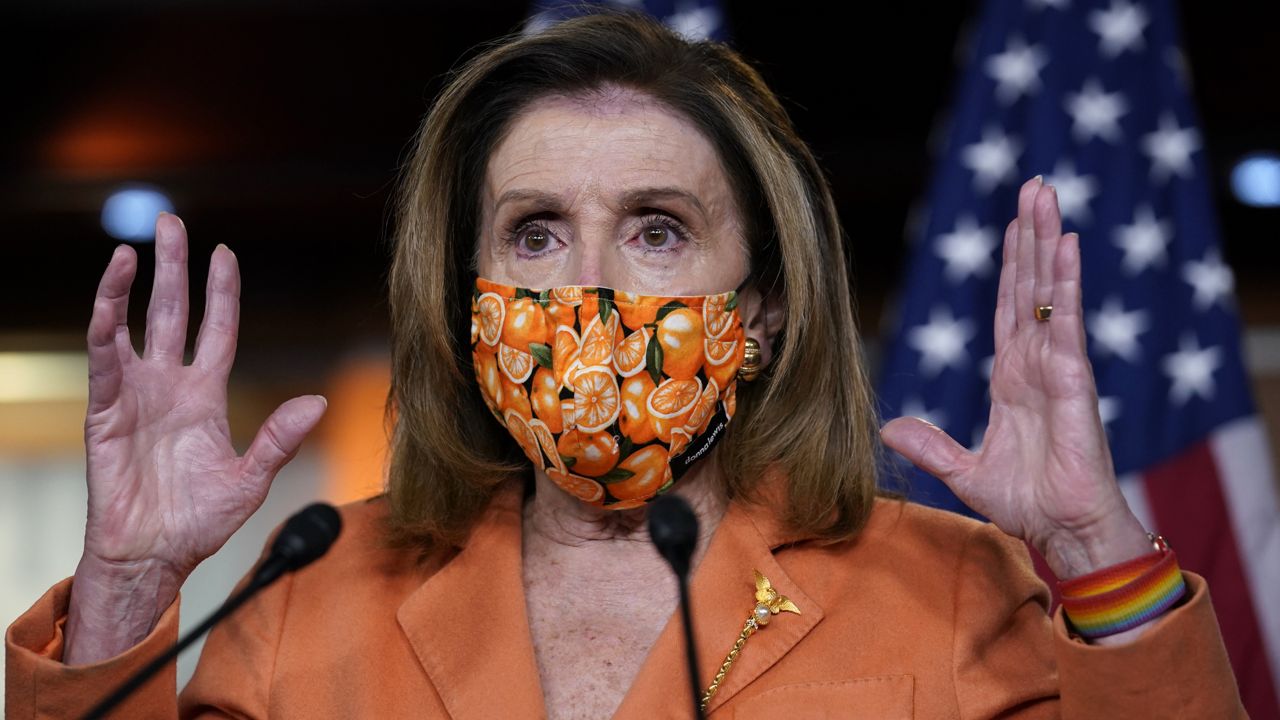WASHINGTON, D.C. — House Speaker Nancy Pelosi’s Tuesday deadline to pass another stimulus package is looming, but it remains to be seen whether or not Congress and President Trump can put aside their differences to come to terms on an economic relief bill.
With a potential deal of almost $2 trillion, Pelosi is angling for the best deal she can get — maybe that’s now, maybe it’s later. It’s a risk she’s willing to take. Trump has upped his offer to $1.8 trillion or more and insisted Monday that “the Republicans will come along” if a deal is reached.
But Republicans have spent months talking about a smaller aid package and the top GOP vote-counter, Sen. John Thune, said Monday that “it would be hard” to find the necessary Republican support for passage of any agreement in the president’s range.
Pelosi reported some progress on reaching a pre-election deal with Trump on a new coronavirus relief package, but the same core problems bedeviling the effort remain in place despite optimistic talk from the president and his team.
Pelosi's deputy chief of staff Drew Hammill tweeted that the Speaker and Treasury Secretary Steven Mnuchin spent nearly an hour negotiating on Monday. The two “continued to narrow their differences,” Hammill wrote, adding that Pelosi “continues to hope” that by Tuesday afternoon, there will be clarity on whether or not the government will be able to pass the relief package before election day.
Speaking to Bloomberg, Pelosi emphasized that she is open to extending the Tuesday "deadline," saying it wasn't necessarily the day where a deal must be reached, but rather the final opportunity for both sides to hammer out their final terms.
"It isn't that this day was a day that we would have a deal, today was a day where we would have our terms on the table to be able to go the next step," Pelosi said.
Pelosi did, however, insist that a bill needs to be finalized by the week's end for it to be voted on before Election Day.
"I'm a legislator, they're not necessarily legislators, so I'm trying to impress upon them: if we want to have this by Election Day and I think we can, we have to engineer back from there to this week," Pelosi said. "Hopefully by the end of the day today, we'll know wherever we all are."
Earlier Tuesday, Trump took his offer a step further, telling "Fox & Friends” that he would support a coronavirus relief bill that’s even pricier than the Democrats’ current $2.2 trillion proposition.
"Let me just explain," Trump said on Fox Tuesday morning. "I want to do it even bigger than the Democrats. Not every Republican agrees, but they will. I want to do it even bigger, because this is money going to people who did not deserve what happened to them."
"I would rather go bigger than that number, but we'll see," Trump added. "(Pelosi) doesn't want to do anything until after the election, because she thinks it helps her. I actually think it helps us, because everyone knows she's the one who's breaking up the deal."
Pelosi has called the $1.8 trillion administration offer inadequate, saying that while the overall Trump offer has gone up, the details on a virus testing plan, aid to state and local governments, and tax cuts for the working poor still aren’t to her satisfaction. She has yet to comment on the president’s most recent remarks on Fox News.
Without an agreement at least in principle by Tuesday, Pelosi says it’ll be too late to enact anything by Election Day. And if history is any guide, prospects for a deal in the lame-duck session after the election could be dim.
If Trump loses, Congress is likely to stagger through a nonproductive session comparable to the abbreviated session after the decisive 2008 Obama-Biden victory or the 2016 session that punted most of its leftovers to the Trump administration. That scenario would push virus aid into 2021.
Also on Tuesday, Senate Republicans are trying to push through two smaller pieces of legislation with targeted coronavirus relief funding.
Trump’s GOP allies in the Senate are backing a virus proposal that at $650 billion or so is only about one-third the size of the measure that Pelosi and Mnuchin are negotiating. But the Senate GOP bill has failed once before, and Trump himself says it’s too puny.
A debate slated for Wednesday on the Senate Republican plan promises to bring a hefty dose of posturing and political gamesmanship, but little more. It will follow a procedural tally Tuesday on a stand-alone renewal of bipartisan Paycheck Protection Program business subsidies that could cause Democratic fracturing but isn’t likely to succeed.
The Associated Press contributed to this report.



